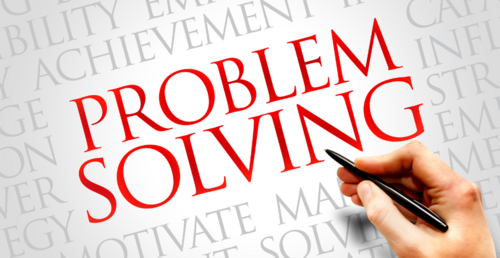
.png)
Problem-solving is essential for entrepreneurs who want to succeed in today’s business world. Entrepreneurs face numerous challenges, and identifying and solving problems is crucial to achieving success. For that, it is crucial to have problem solving skills for entrepreneurs.
Typically, problem solving skills help to think critically and creatively to develop effective solutions to improve business performance. They also help entrepreneurs communicate effectively, lead confidently, and identify opportunities to grow their businesses.
So, if you aren't an entrepreneur in your own right, there's much you can gain from adopting the problem-solving tactics of someone who is -- someone who's a success at both entrepreneurship and decision-making.
Applying different modes of thinking and new leadership styles, and being open to more potential problem-solving options are the strategies that will help you solve problems more thoroughly, and reap better long-term results.
Problem-solving is one of the most important aspects of entrepreneurship. As both the founder of your organization and the leader of your team, you'll be responsible for identifying and solving the problems of your customers, partners, employees and your company, in general.
The question might be posed as to whether successful entrepreneur-problem-solvers use their natural talents to find success, or whether those skills are caltivated after years of experience. But, either way, I would maintain that successful entrepreneurs think about and solve problems differently from most other professionals.
In this blog, we will explore the importance of problem solving skills for entrepreneurs and provide practical tips and strategies to help them develop and enhance these skills.
How is this problem solving process distinctive, and how can you apply that difference to your own work habits? And what's different about entrepreneurs-as-problem-solvers in the first place? Here are six ways:

Some people think of entrepreneurial types as creative inventors; given a blank canvas, they can come up with a product that people will love. But that's not usually the case. Instead, the most successful entrepreneurs are those who first identify a key problem in the market, then work to solve that problem.
Airbnb, for example, started when its two founders, Brian Chesky and Joe Gebbia, realized that two problems existed in the same business area; one, they themselves were having trouble affording rent in New York; and two, nearly all the hotel rooms in the city were consistently booked. Those founders didn't come up with their idea out of thin air; they recognized two key problems, and devised a solution to solve both simultaneously.
According to a study by TalentSmart, 90 percent of top performers are able to manage their emotions successfully when they experience high levels of stress. This isn't a coincidence: When you allow your emotions to get the better of you when facing a problem, you subject yourself to reactive decision-making, and lose touch with your logical side. Accordingly, you make poorer decisions, and in some cases, may look bad in front of your employees.
Of course, "staying calm" when you face a major issue is, itself, a major issue. It takes years of practice and self-discipline to learn how to prevent your emotions from taking over. You need the kind of perspective that only high-stress experiences can give you. That perspective? No problem, by itself, is unconquerable or incapable of being solved through alternative approaches.
When addressing a problem, most people get caught up in the details, but successful entrepreneur-strategists tend to think about problems more generally before working down to the specific details. For example, if entrepreneurs' cars break down on the side of the road, they aren't immediately concerned with the peculiarities of the engine that led to its malfunction; instead, they recognize that the car isn't drivable, and work to get it to the shoulder -- and safety.
This approach helps you see the high-level nature (and consequences) of your current problem, giving you a reliable context for solving it.

Successful entrepreneurs are also willing to adapt to solve a problem; they aren't beholden to the image, processes or lines of thinking that got them into the problem in the first place.
For example, Nokia -- probably best known as the top cell phone provider in the world between 1998 and 2012 -- started out as a paper company that later transitioned to producing rubber tires and galoshes (as the needs of its customers changed). When the demand rose for military and emergency service radio phones, Nokia transitioned again and started making those devices, eventually selling off its paper and rubber divisions.
In short, faced with changing available resources, market demand and competition, Nokia reinvented itself rather than remaining stagnant or applying old rubrics to new problems.
Entrepreneurs also know they aren't the most effective problem-solvers on their own; instead, most problems are best handed over to specialists who better understand those problems. Accordingly, when an entrepreneur faces a tough decision or a difficult situation, he or she typically delegates the judgment needed to an expert and calls in help to carry out that expert's solution as efficiently as possible.
Entrepreneurs also aren't afraid to delegate authority to the internal hires they trust, and aren't hesitant to spend money on external firms and consultants if that solution will solve the problem faster and more efficiently.
Successful entrepreneurs actually do more than just solve the problem. After applying a fix, they spend time measuring the results of their efforts with analytics tools, and reflecting on those outcomes. Learning from the approach they've chosen, whether it turns out to be a success or failure, is what equips them to make even better decisions in the future.

Problem-solving skills are an essential element of successful entrepreneurship. Entrepreneurs must be able to recognize issues, evaluate them for possible remedies, and select the best one.
Creative thinking, critical thinking, and analytical skills are essential for effective problem solving. Communication and people skills are also important, as entrepreneurs need to effectively communicate their ideas and work with others to implement solutions.
Additionally, leadership skills are critical for leading teams and driving business success. The problem-solving process is key for entrepreneurs, who must identify opportunities and develop innovative solutions to drive their businesses forward.
Entrepreneurship is creating, developing, and managing a new business venture. Success requires a unique set of skills, abilities, and approaches. One of the most important skills for entrepreneurs is problem-solving. Below, we will discuss the importance of problem-solving skills for entrepreneurs and how it can impact their businesses.
One of the most critical elements of problem-solving is critical thinking. Entrepreneurs need to be able to analyze situations, identify problems, and develop potential solutions. This requires them to have strong analytical and creative thinking skills. They need to be able to approach problems from different angles, identify patterns, and think outside the box to find innovative solutions.
Effective problem-solving can significantly impact the performance of a business. Entrepreneurs who are skilled at problem-solving can identify and address issues quickly, leading to increased efficiency and productivity. They can also identify opportunities for improvement and develop new and innovative solutions to stay ahead of the competition.

Problem-solving also requires strong communication and leadership skills. Entrepreneurs need to communicate their ideas and solutions effectively to their teams, stakeholders, and customers. They need to motivate and inspire their team to take action and implement the solutions. This requires strong leadership skills, including delegating tasks and responsibilities, building a positive company culture, and leading by example.
Entrepreneurs with strong problem-solving skills often have an entrepreneurial mindset. They are always looking for new opportunities and ways to improve their businesses. They are unafraid to take risks and try new approaches to solve problems. This mindset is essential for identifying entrepreneurial opportunities and developing new and innovative business models.
Entrepreneurs encounter numerous challenges while starting and managing their businesses, and the ability to solve problems creatively is an essential element of entrepreneurship. Here, we will explore different approaches entrepreneurs can use to develop their problem-solving skills.

Critical thinking is an essential skill for entrepreneurs to solve problems effectively. Entrepreneurs need to analyze a situation critically, identify the root cause of the problem, and evaluate potential solutions. Entrepreneurs can engage in activities such as reading challenging books, debating, and solving puzzles to improve critical thinking skills.
Entrepreneurs should have the ability to think creatively when solving problems. Entrepreneurs can cultivate their creative thinking skills by exploring new experiences, brainstorming ideas, and challenging assumptions. When entrepreneurs use creative thinking, they can develop innovative solutions to complex problems.
Entrepreneurs need to have excellent communication and leadership skills to solve problems effectively. Good communication skills help entrepreneurs communicate their ideas and solutions effectively to others. Similarly, leadership skills help entrepreneurs to motivate and guide their teams toward finding solutions to problem.

Entrepreneurs can develop their problem-solving skills by thinking outside the box. When entrepreneurs use divergent thinking, they can generate many potential solutions to a problem. Entrepreneurs can develop innovative and effective solutions to complex problems by exploring different perspectives and considering unconventional solutions.
Entrepreneurs can also utilize various tools and resources to develop their problem-solving skills. These tools and resources include business books, online courses, mentorship programs, and workshops. Such resources can help entrepreneurs to learn new problem-solving techniques and strategies.

Effective problem-solving is a crucial element of entrepreneurship. Successful entrepreneurs need to possess strong problem-solving skills to identify and resolve challenges in their businesses. Here are the seven steps to effective problem-solving for entrepreneurs:
The first step in solving any problem is to identify it. Entrepreneurs should use critical thinking skills to recognize the problem and what caused it. The ability to pinpoint the problem accurately will help in developing an effective solution.
Once the problem is identified, the next step is to gather as much information as possible. Entrepreneurs should use their research skills to collect data, analyze trends, and look for insights into the problem. This step provides a better understanding of the issue, which is crucial in problem-solving.
After gathering the relevant information, entrepreneurs should analyze the problem to determine the root cause. Analyzing the problem enables entrepreneurs to understand the situation more deeply and identify possible barriers to finding an effective solution.
The next step is to brainstorm and generate potential solutions to the problem. Entrepreneurs should use their creative thinking skills to develop innovative solutions to address the issue. There may be various approaches to solving the problem, and entrepreneurs should consider them all.

Entrepreneurs should evaluate all potential solutions to determine which ones are feasible, effective, and have the highest chances of success. They should consider the potential impact of each solution on the business and choose the best one that aligns with their business goals.
After selecting the best solution, entrepreneurs should create a plan to implement it effectively. The implementation plan should outline the steps required to implement the solution, including the timelines and resources needed.
Once the solution is implemented, entrepreneurs should monitor its progress and evaluate its effectiveness. This step helps identify any issues that may arise during the implementation process and make adjustments as necessary. Continuous monitoring and evaluation are crucial to ensure that the solution is sustainable and effective in the long run.

The discussion above has highlighted the importance of problem solving skills for entrepreneurs. Problem-solving skills are essential to identify, analyze, and develop solutions.
Entrepreneurs must also be able to adapt to the ever-changing business landscape and come up with innovative solutions. Problem-solving skills help entrepreneurs make better decisions, improve their productivity and increase their chances of success.
Problem solving skills enable entrepreneurs to anticipate problems and take proactive steps to prevent them. Clearly, problem solving skills play a major role in the success of entrepreneurs and should be developed and practiced regularly.
Markethive - a Powerful Ecosystem for Entrepreneurs.

MarketHive is an entrepreneurial social marketing platform with the combined strength of LinkedIn, Amazon, Facebook and Marketo.
Markethive is at the forefront of marketing in today's online environment.
It's the perfect marketing platform for online marketers, businesses, affiliate marketers, brands, cryptocurrency enthusiasts, investors and anyone else that requires an online presence.
More info HERE <<<<

About: Andries vanTonder
Over 40 years selfemployed
He is a Serial Entrepreneur, an Enthusiastic supporter of Blockchain Technology and a Cryptocurrency Investor
Find me at my Markethive Profile Page | My Twitter Account | My Instagram Acount | and my Facebook Profile.
